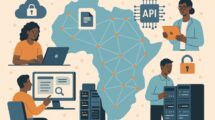This article was originally posted on GÉANT’s CONNECT blog.
Seven leading regional and national Research and Education networks and organisations across multiple continents announced the establishment of the “Bridging Europe, Africa and the Americas” (BEAA) Collaboration, aiming to increase the resilience of their networks across a set of transoceanic links that interconnect their communities in Eastern and Southern Africa, Europe and Latin America.
The BEAA Collaboration was formalised through a Memorandum of Understanding (MoU), signed between AmLight/the Florida International University Board of Trustees, GÉANT, RedCLARA, RNP, the Council for Scientific and Industrial Research (CSIR), TENET and the UbuntuNet Alliance. All partners agreed to collaborate for an initial period of three years, by providing mutual back-up through high-capacity links and resources.
Back-up connectivity enabled by the agreement will ensure that advanced Research and Education collaborations among the regions will continue even in case of service outages. Participating organisations will use the capacity provided by the agreed back-up arrangements to carry high volumes of data required for data-intensive research, including – notably – Earth Observation (EO) data of the European Union’s Copernicus programme.
Opening a new chapter in the R&E collaboration between Europe, Africa and the Americas, the BEAA agreement showcases an increasingly resilient, flexible and interconnected global R&E networking ecosystem, apt to support scientists worldwide in tackling the big scientific challenges of our times.
“The collaborative efforts by the Research and Education (R&E) Networks to increase connectivity and capacity in the South Atlantic has been transformational. The BEAA collaboration will leverage this outcome to increase network resilience in support of the global R&E communities.”, said Julio Ibarra, Principal Investigator, AmLight.
“GÉANT is pleased to reinforce the longstanding collaboration between the Research and Education Networks in Europe, Africa and the Americas by joining the BEAA collaboration. This joint effort will contribute to strengthen the global fabric of research and education networking, ensuring mutual back-up connectivity and increasing resilience for the ultimate benefit of researchers, educators and learners across our regions.”, said Erik Huizer, CEO, GÉANT.
“The agreement established to strengthen the connection between Europe, Africa and the Americas is a clear example of the value of cooperation between the world’s research and education networks. Seven organizations participate in the agreement and, through it, they will establish routes of support for the already existing connectivity between them. These efforts strengthen the network ecosystem that supports education, research and innovation at a global level and RedCLARA feels very proud and grateful to its partners in this agreement for the enormous improvement in connectivity achieved”, said Luis Eliécer Cadenas, Executive Director, RedCLARA.
“This BEAA MoU is very important for all of us NRENs who have international operations in the South Atlantic, as it establishes a collaboration of mutual back-up across of our international high-capacity links and resources operated by us. This will result in greater resilience of our individual infrastructures and, thus, it will contribute to strengthen our advanced research and education collaboration, interconnecting our respective links at Global R&E Network Exchange Points”, said Eduardo Grizendi, Engineering and Operations director, RNP.
“TENET is proud to contribute to this collaborative endeavour, which illuminates the power of NRENs working in concert, and which will further the interests of global research and education generally and of the communities that TENET serves.”, said Duncan Greaves, CEO, TENET.
“We, at UbuntuNet Alliance, are delighted to be part of this global initiative aimed at increasing network resilience between Africa, Europe and the Americas over the Atlantic. This collaboration means that researchers in these regions are much closer to each other and will have reliable network services as they work together in pursuit of the discovery of knowledge.” – said Prof Madara Ogot, CEO, UbuntuNet Alliance





